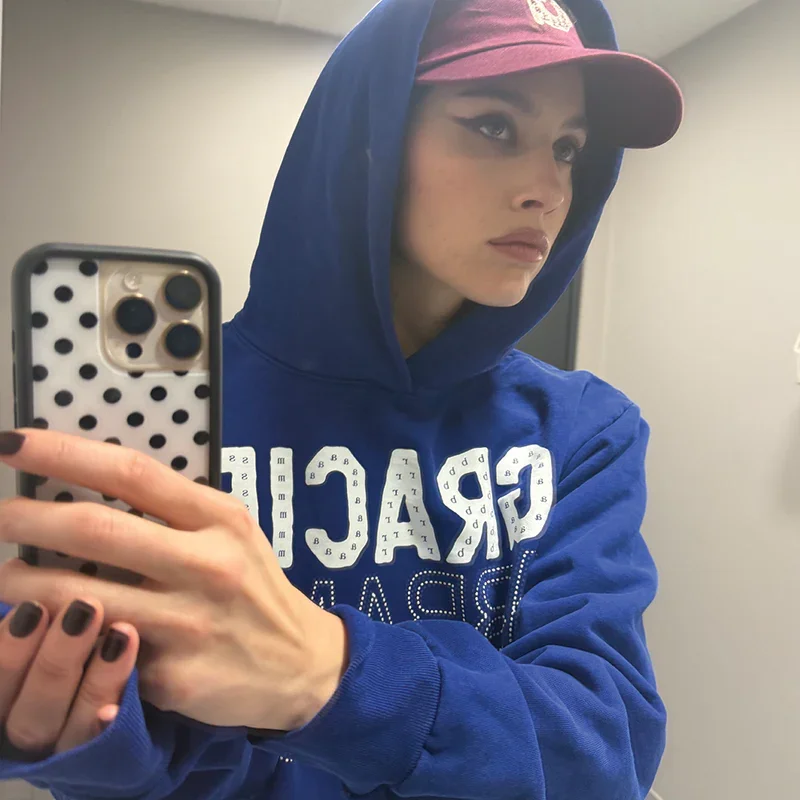The Rebrand of the "Nepo Baby"
Celebrity culture has always favored a familiar face, especially when that face comes with a famous last name. Nepotism is nothing new; we’re just finally noticing it. In 2022, TikTok coined the term “nepo baby” in reference to stars like Gracie Abrams, Lila Moss, and Maude Apatow, whose fame began long before they did. Their introductions to the industry didn't happen in casting offices or agency meetings. Instead, their celebrity status was announced in their occupied hospital room, beginning the moment they were born.
Source: Gracie Abrams Official Store
People have always been obsessed with knowing the inside details of celebrities’ lives, from the icon’s workout routines to their romantic relationships. Admit it: you have at least one celebrity you know just a little too much about.
This fascination is often less about the person themselves and more about the lifestyle they live. The typical person’s mind can't help but occasionally drift off into the thought of living their fantasy life, unscathed by financial worries.
Now that social media and digital culture are bigger than ever, the luxury of these celebrities is no longer an illusion. The ‘fantasy life’ is closer to viewers than it ever has been before. What was once hidden behind magazine covers is now broadcast daily through vlogs, Instagram posts, and TikTok feeds. We see inside their homes and beneath their vacations. We can't help but notice their complete detachment from money, spending thousands like it’s nothing.
With this new transparency, the rise of the so-called “nepo baby” was inevitable. The children of stars we grew up loving are now of age and stepping into the spotlight, but now, it’s right on your TikTok for you to see.
Remember the last time you were grounded for trying to charter a helicopter across the country on your dad’s credit card? Probably not, because that level of rebellion doesn't exist in most teenagers' worlds.
For Romy Mars, the defiant daughter of filmmaker Sofia Coppola and musician Thomas Mars, this was a casual Friday night. This also marked the beginning of the now-popular star’s career, after posting a TikTok that inevitably went viral, in which she made pasta and casually shared details about her grounding and privileged background.
Source: Pexels
After traction from that stunt, the then 16-year-old icon began to attract a large audience on TikTok and Instagram, her content revolving around her unattainable lifestyle. Mars didn't attempt in any manner to be humble, and her videos were often flaunting or making jokes about the privilege passed down to her. The people loved it.
Her Gen-Z audience found it funny and upfront, with many commenting that they would act the same if they were in her shoes. Then, the young icon began to release music, which was adored by fans. One of her first hits, “A-Lister,” mocked the fantasy world she lives in, rolling its eyes at the emptiness of fame while fully embracing the spoiled role. The attention she gained was clearly not only due to the song’s catchiness, but also the personal connection that she had already created with her audience.
Source: Unsplash
In a different light, North West, the daughter of reality TV star Kim Kardashian and rapper Kanye West, received attention and gained her nepotism benefits through TikTok as well. The 12-year-old started posting lip-syncing videos with her mom in 2022, when she was only 8 years old. This blew the internet's mind, seeing Kim Kardashian in a new, maternal light, and being shocked by the spunky personality burning in North.
Many commented that she was born to be an icon or that she got her father’s humor. West would often post pictures of herself wearing full designer outfits and mouthing the words to her dad’s music. She would also post videos of herself making slime or playing jokes on her siblings, like any other early teenager. West is growing up on TikTok, and her fame isn’t only by association anymore; she’s become a young celebrity herself.
This attention— and of course, her nepotism first— has granted her the opportunity not only to create a social media persona, but also to perform. From opening her father’s Yeezy show to performing in The Lion King concert at the Hollywood Bowl, West has found her way into the spotlight.
The early teenager has already turned her viral online presence into a real career platform, and branded herself authentically. Her approach to fame shows that this younger generation of “nepo-babies” isn’t hiding their privilege, but instead using it openly as a part of their identity.
Before social media became so personal, celebrity children didn’t have the ability to shape their image. Nepotism was just as present, but it was less valued by the public and often criticized. There wasn't a place for past nepo-babies’ to express irony or self-awareness, and for all the public was concerned, these stars didn’t deserve their place in the industry. The expectation was that these children of celebrities would earn their place in Hollywood through talent, not lineage.
Sofia Coppola, Romy Mars’ mother, experienced this firsthand. Before she turned to filmmaking, her father, Francis Ford Coppola, helped introduce her to the acting industry. One of her first big movie roles was replacing a character in The Godfather 3, a movie directed by her father.
The public's reaction to this role was widely negative, and many believed she didn’t deserve that role, saying she had poor acting skills and only got the role because of her father. But at the time, social media was not around, so Coppola had no place to explain herself. She couldn’t make a TikTok story-time or a targeted lip-sync video expressing her side.
Source: Pexels
North West’s aunt, Kendall Jenner, who was born into the infamous Kardashian family, also received backlash due to her connections as she began her career. She began modeling at 14 years old, and by the time she was 23, she was named the highest paid supermodel in the world by Forbes.
Despite her high praise in the modeling industry, the public did not respect Jenner; they believed her status was undeserved, and strictly a result of her family's roots and fame prior. People commented that her walk was weak and that she didn’t bring anything new to the fashion industry. Even though social media existed during Jenner’s early career, it was not yet a place of self-awareness or irony. Speaking out about her nepotism or defending her place in the industry would have been seen as defensive rather than relatable.
Source: Pexels
At the end of the day, being born into nepotism is not something you choose. So if the privilege is there, you might as well use it. This is the conclusion the younger generation of viewers—as well as the younger generation of nepo-babies— has come to. As social media has evolved, it had transformed into a place where transparency and humor are rewarded. This new generation of stars has learned to acknowledge their privilege openly, and to use their youth as a way of relating to their audience. Instead of hiding from the label, they’ve rebranded it, turning “nepo-baby” from an insult, into an aesthetic.
Their success also says as much about the audience, as it does about them. Gen-Z doesn’t look for perfection or mystery in fame as the public once did in the past; they look for honesty, understanding, and most importantly, excitement.
What are your thoughts on the “nepo baby?” Leave a comment below!





